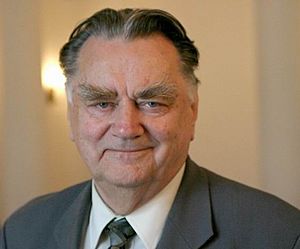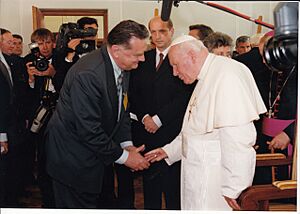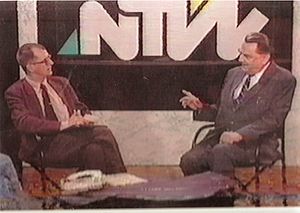Jan Olszewski facts for kids
Quick facts for kids
Jan Olszewski
|
|
|---|---|
 |
|
| Prime Minister of Poland | |
| In office 6 December 1991 – 5 June 1992 |
|
| President | Lech Wałęsa |
| Preceded by | Jan Krzysztof Bielecki |
| Succeeded by | Waldemar Pawlak |
| Member of the Sejm | |
| In office 18 June 1991 – 31 March 1993 |
|
| Constituency | Warsaw I |
| In office 20 October 1997 – 18 October 2005 |
|
| Constituency | Warsaw I |
| Personal details | |
| Born |
Jan Ferdynand Olszewski
20 August 1930 Warsaw, Poland |
| Died | 7 February 2019 (aged 88) Warsaw, Poland |
| Resting place | Powązki Military Cemetery |
| Political party | Solidarity Citizens' Committee (1988–1990) Centre Agreement (1990–1992) Movement for the Republic (1992–1995) Movement for the Reconstruction of Poland (1995–2012) |
| Spouse | Marta Miklaszewska |
| Alma mater | University of Warsaw |
| Awards | |
| Signature |  |
Jan Ferdynand Olszewski (born 20 August 1930 – died 7 February 2019) was a Polish lawyer and politician. He served as the Prime Minister of Poland for about five months. This was between December 1991 and June 1992. He later became a key leader of the conservative Movement for the Reconstruction of Poland.
During his time as Prime Minister, Poland faced new international situations. The Soviet Union broke apart in late 1991. This made his government want to join NATO and the European Community. For the first time, joining NATO was officially part of Poland's defense plan. Talks to remove Russian armies from Poland, which started in 1990, sped up.
Olszewski's government also changed how state-owned companies were sold to private owners. This led to disagreements with other political groups. He also opposed a part of a treaty with Russia. This part would have given former Russian military bases to Polish-Russian companies. President Lech Wałęsa changed this part after Olszewski's objection. However, this did not stop further conflicts between the Prime Minister and the President.
Olszewski's government did not have strong support from most members of parliament. Attempts to get more parties to join his government failed. On 28 May, the parliament passed a rule. It said the Minister of Interior must publish a list of people who worked with the communist secret police. This list was published just hours before Olszewski's government was removed.
On 5 June 1992, after midnight, the parliament voted. They decided that Olszewski's government should resign. This event is sometimes called "the nightshift." Olszewski was replaced by Waldemar Pawlak. Olszewski's time as Prime Minister was one of the shortest in Poland's modern history.
Contents
Early Life and World War II Actions
Jan Olszewski was born in Warsaw on 20 August 1930. His family worked in the railway industry. They were connected to the Polish Socialist Party. Olszewski was related to Stefan Aleksander Okrzeja. He was a Polish socialist who was executed in 1905.
During World War II, Olszewski was part of the Szare Szeregi (Grey Ranks). This was a secret part of the Polish Scouting Association. He also took part in the Warsaw Uprising in 1944.
Political Journey
Olszewski studied law at the University of Warsaw. After finishing his studies, he worked for the Ministry of Justice. Later, he worked at the Polish Academy of Sciences. In 1956, he started writing for the Po prostu magazine. From 1956 to 1962, he was a member of the Crooked Circle Club. This was a secret group in Warsaw where thinkers discussed ideas critical of the government.
In the 1960s, Olszewski became a leading lawyer. He defended people in political trials. He defended famous writers and activists. He also signed the Letter of 59 in 1975. This was a public protest against changes to the country's communist constitution.
Olszewski joined the Solidarity movement in the early 1980s. He quickly became an important figure. He helped write the group's main rules. He was one of Solidarity's most active lawyers.
After the communist government fell in 1989, Olszewski became a member of the State Tribunal. He held this job until 1991. In 1990, he joined the Centre Agreement party. This party mostly supported Lech Wałęsa in the presidential election that year.
After Prime Minister Tadeusz Mazowiecki resigned, President Wałęsa looked for a new prime minister. Wałęsa first asked Olszewski to take the job. However, Olszewski refused because he disagreed with Wałęsa on how the government should be set up. Instead, Jan Krzysztof Bielecki became Prime Minister. His government lasted until the end of 1991. It ended after the 1991 parliamentary elections did not produce a clear winner.
President Wałęsa then appointed Bronisław Geremek as prime minister. But five parties in parliament agreed to choose the next leader together. These parties supported Olszewski. He was a respected lawyer from the Solidarity movement. Wałęsa, even though he didn't get along well with Olszewski, agreed to appoint him on 6 December. It took three weeks to choose the government's ministers. During this time, some parties withdrew their support from Olszewski. Despite this, Olszewski's government, which did not have a majority, was approved by parliament on 23 December 1991.
Prime Minister: 1991-1992
Foreign and Domestic Policy Goals
After taking office, Olszewski's government faced many challenges. Olszewski had criticized the previous government's economic plan. He opposed its "shock therapy" program, which involved quick and drastic economic changes. He replaced the finance minister with someone who also criticized this plan.
Unemployment was rising, and the country's economy was shrinking. Olszewski wanted to change the economic plan. He proposed reforms to make it easier to get loans. He also wanted to support farmers and state-owned companies more. He suggested combining economic ministries to better manage privatizations and trade. However, the parliament was divided and rejected his ideas.
Olszewski believed in free markets. But his government was weak and lacked a majority. This made it hard to reverse the previous economic plan. He needed support from other parties, but they wanted to prioritize economic reforms. The parties in his own government also had disagreements.
In foreign policy, Olszewski's government continued to aim for joining NATO. His defense minister, Jan Parys, was against Russia. The foreign minister, Krzysztof Skubiszewski, tried to balance relations with both the West and Moscow.
President Wałęsa disagreed with Olszewski. He thought Poland should build a new military alliance with former Warsaw Pact countries. Wałęsa was worried about the breakup of Yugoslavia and the Soviet Union. He feared joining NATO would make Russia an enemy. Olszewski accused Wałęsa of making foreign policy too friendly with Russia.
Olszewski also believed that Poland's relationship with Ukraine should be as important as its relationship with Russia. At the same time, financial relations with Western countries became difficult. The International Monetary Fund (IMF) wanted Poland to have a strict budget to continue lending money. Olszewski tried to appoint a new finance minister who was seen as supporting tough economic reforms. However, when parliament approved salary and pension increases, the new minister resigned. He said he couldn't explain the government's economic choices to the IMF.
Cleaning Up After Communism
The conflict between Olszewski and Wałęsa grew in 1992. Olszewski saw his government as strongly anti-communist. He believed that communist agents still held power in Poland. He wanted to remove them, especially from the economy. He thought they were stopping Poland's new free market. Olszewski wanted more democracy and to remove communist influences from all parts of Polish society.
His defense minister, Jan Parys, also worked to remove communist influences from the Polish Armed Forces. He wanted civilian leaders to control the military. These plans clashed with Wałęsa's desire to control the defense system. Parys and Wałęsa often argued about how to organize national security.
In April 1992, Parys accused Wałęsa's allies of interfering with the defense ministry. He said "certain politicians" were promising promotions to army officers. He believed this was to get the army's support for political moves. Parys suggested a possible military takeover. To calm the situation, Olszewski temporarily removed Parys from his job. A special group in parliament investigated Parys's claims. They found Wałęsa innocent and said Parys's claims were false. Parys then resigned. After this, Wałęsa complained about how Olszewski's government handled the issue. The relationship between Olszewski and Wałęsa became even worse.
Disagreements with President Wałęsa
The growing disagreements between Olszewski and Wałęsa started to affect foreign policy. Both men wanted to control the economy, the military, and international relations. This was especially true for talks about removing Russian troops from Poland. The foreign minister said it was hard to manage foreign policy for a country that was unstable inside.
Olszewski believed his position as Prime Minister, along with his ministers, should lead state affairs. Wałęsa, as President, believed he was ultimately in charge. This created a very tense political environment.
Olszewski strongly disagreed with the Foreign Ministry's talks with Russia about money and business deals related to troop withdrawals. Many close to Olszewski thought these deals meant a new kind of Russian control. However, President Wałęsa strongly supported reaching a final agreement. Meetings between Olszewski and Wałęsa in May 1992 showed their differences. Olszewski wanted to remove any article about joint Polish-Russian financial deals from the treaty. Wałęsa said he would go to Russia to sign the agreement, not to negotiate it.
Government Dismissal
By late May, Olszewski's government was close to falling apart. After returning from Moscow, President Wałęsa formally asked parliament to stop supporting Olszewski's government. He said he had no trust in it. Wałęsa said the government made "irresponsible steps in foreign affairs." He immediately demanded the government be dismissed.
Late on the night of 4 June, Olszewski gave a surprise speech on TV. He defended his government's list of former communist secret police collaborators. He asked the public to support his government.
In the early hours of 5 June, parliament met for a vote to remove the government. This event is known as "the nightshift." Despite Olszewski's public appeals, most members of parliament voted to dismiss him. The vote passed with 273 in favor and 119 against. Olszewski was immediately replaced by Waldemar Pawlak, who was an ally of Wałęsa.
After Being Prime Minister

After being removed as Prime Minister, Olszewski continued his work as a member of parliament.
In 1995, Olszewski ran for president in the election that year. He wanted to replace his rival, Wałęsa. He campaigned on an anti-communist and patriotic message. He received over 1.2 million votes, coming in fourth place. In the 2000 presidential election, Olszewski ran again. But he withdrew before the vote and supported another candidate.
In 2005, Olszewski and his former ministers created the Patriotic Movement. This was a right-wing political group. He became its leader. In the parliamentary election that year, Olszewski ran for a seat in the Senate. He lost this election.
After leaving parliament, Olszewski became deputy chairman of the State Tribunal from 2005 to 2006. President Lech Kaczyński later appointed Olszewski as a presidential adviser in April 2006. He held this job until Kaczyński's death in the 2010 Smolensk air disaster.
Personal Life and Passing
Olszewski was married to Marta Olszewska. She was an activist, editor, and journalist. On 16 August 2000, Olszewski was involved in a car accident. This happened on national road 8 near Marków-Towarzystwo. The driver of the car, who was Olszewski's party treasurer, died in the crash. Olszewski had only minor injuries.
In July 2014, Olszewski was made an honorary citizen of Warsaw. This was for his part in the Warsaw Uprising and his moral leadership. Olszewski passed away after a long illness on 7 February 2019 in a Warsaw hospital.
His Legacy
Jan Olszewski remains a debated figure in Polish politics. Some right-wing politicians, like Law and Justice leader Jarosław Kaczyński, have praised him. They admired his anti-communist views and legal principles. On the 20th anniversary of Olszewski's government being removed, Kaczyński praised him. He said Olszewski tried to stop quick privatizations in the early 1990s. He also helped guide Poland towards joining NATO.
Former Interior Minister Antoni Macierewicz also believed that if Olszewski's government had not fallen, the Smolensk disaster would not have happened.
Other politicians have viewed Olszewski more critically. Christian National Union politician Stefan Niesiołowski initially defended Olszewski in 1992. But later, he regretted his defense. He described Olszewski as supporting a "moral lie" with the list of collaborators.
Prime Minister Donald Tusk also accused Olszewski of misleading information in 2008. This was during an investigation into communist-era records. Tusk said some politicians spend their lives in archives, "poisoning our public space" with their own interpretations.
In a poll in 2014, people were asked to name the best prime minister of the Third Republic. Olszewski was placed seventh. Another poll later that year put him in sixth place.
See also
In Spanish: Jan Olszewski para niños
 | Kyle Baker |
 | Joseph Yoakum |
 | Laura Wheeler Waring |
 | Henry Ossawa Tanner |


